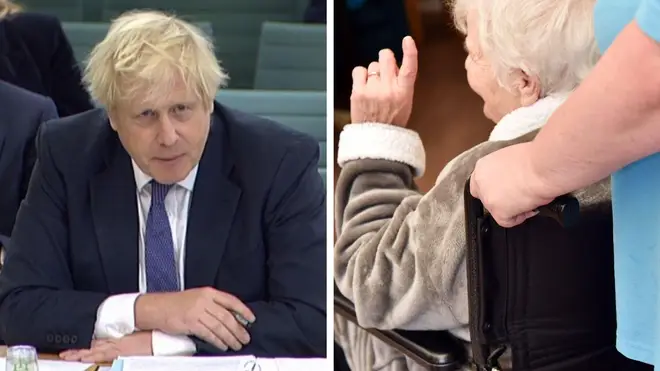
Paul Brand 10am - 12pm
22 November 2021, 22:14 | Updated: 23 November 2021, 04:48

MPs have backed controversial changes to the Government's proposed social care reforms, despite fears it will hit poorer pensioners hardest.
Boris Johnson saw the plans pass but the majority of 80 he won in the 2019 election was slashed to just 26 on Monday evening.
In September, the Government announced that an £86,000 cap on care costs will be put in place from October 2023.
The cap will mean no-one in England will have to pay more than £86,000 on personal care over their lifetime. This does not impact day-to-day living costs such as rent and food bills, which are not funded by the Government.
In a vote on Monday evening, MPs voted in favour of an amendment to the Care Act 2014, which establishes that only the amount that an individual contributes towards personal costs will count.
Critics accused the Government of watering down the plans. Labour said the amendment will disadvantage homeowners in areas with lower house prices, who will have to give up a larger proportion of their assets to pay for care.
Backbench Tories, Labour MPs and experts all warned the decision to only count individual payments in the cap, and not local authority contributions, will cost poorer people more in assets than the wealthy.
Read more: Government's 'sneaky' changes on social care costs will 'hit poorest pensioners hardest'
Read more: James O'Brien's merciless criticism of PM's social care changes

Social care: Mike Padgham speaks to LBC's Eddie Mair
And the vote only sneaked through amid anger at the plans from the Tories' own backbenches, with 272 MPs voting for and 246 against.
A total of 19 Conservatives voted against, while 68 did not cast a vote.
Despite facing a rebellion, the Prime Minister insisted his plans for reform of social care funding are "incredibly generous".
Ministers could not say if the change to the cap on costs would meet an election pledge to ensure nobody needed to sell their home to pay for their care.
Neither could the Prime Minister's official spokesman, who admitted: "I can't predict individual situations."
Tonight Conservative MPs voted to break their promise that nobody would have to sell their homes to pay for their social care costs and voted to hammer poorer pensions to protect millionaires in mansions.
— Angela Rayner (@AngelaRayner) November 22, 2021
It’s an inheritance tax on the north and a con, not a social care plan.
Under the plans, people with assets up to £20,000 will not have to contribute anything to their care (up from £14,250), while those with assets up to £100,000 will be eligible to receive some local authority support (up from £23,250).
Labour has claimed the changes could leave the average homeowner in two-thirds of northern areas having to pay more towards their care, while in the Midlands a third would be worse off.
Experts say that poorer individuals will reach the cap faster than richer people, meaning more of their assets will end up being put to care costs.
Read more: Boris Johnson faces Tory rebellion over 'unfair' social care reforms

Ben Kentish on PM's address to CBI
Shadow Health Secretary Jonathan Ashworth said pensioners with "modest assets" would be hit hardest by the changes.
"Government ministers have not only whacked up tax on working people but are now asking MPs to vote for pensioners across the North and Midlands with modest assets to be hit hardest under Boris Johnson's care con," he said.
But Health Secretary Sajid Javid urged that "everyone will be better off" under the social care reforms.
Senior Tories had warned they did not want to support the new proposals, in light of criticism they were watered down.
Ex-chief whip Mark Harper said he would oppose the plans, while former justice secretary Robert Buckland asked ministers to "look again".
The closeness of the vote follows anger at the Owen Paterson "sleaze row", and ended a day where Boris Johnson was mocked for a bumbling, meandering business speech where he lost his place and talked about Peppa Pig.
The Health and Care Bill will be debated by MPs again on Tuesday before being sent to the House of Lords.